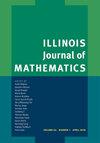,原始函数和泊松函数
IF 0.7
Q3 MATHEMATICS
引用次数: 0
摘要
质数$p$的质数$p\#$是所有质数$q\le p$的乘积。设pr $(n)$用$p\# \mid \phi(n)$表示最大的素数$p$,其中$\phi$为欧拉全等函数。我们证明了pr $(n)$的正常阶为$\log\log n/\log\log\log n$。也就是说,pr $(n) \sim \log\log n/\log\log\log n$在密度为1的整数集合上等于$n\to\infty$。事实上,我们证明了有一个渐近的次级项,在一个三级上,有一个渐近的泊松分布。我们还用$k!\mid \phi(n)$展示了最大整数$k$的类似结果。本文章由计算机程序翻译,如有差异,请以英文原文为准。
Phi, primorials, and Poisson
The primorial $p\#$ of a prime $p$ is the product of all primes $q\le p$. Let pr$(n)$ denote the largest prime $p$ with $p\# \mid \phi(n)$, where $\phi$ is Euler's totient function. We show that the normal order of pr$(n)$ is $\log\log n/\log\log\log n$. That is, pr$(n) \sim \log\log n/\log\log\log n$ as $n\to\infty$ on a set of integers of asymptotic density 1. In fact we show there is an asymptotic secondary term and, on a tertiary level, there is an asymptotic Poisson distribution. We also show an analogous result for the largest integer $k$ with $k!\mid \phi(n)$.
求助全文
通过发布文献求助,成功后即可免费获取论文全文。
去求助
来源期刊
CiteScore
0.90
自引率
0.00%
发文量
18
期刊介绍:
IJM strives to publish high quality research papers in all areas of mainstream mathematics that are of interest to a substantial number of its readers.
IJM is published by Duke University Press on behalf of the Department of Mathematics at the University of Illinois at Urbana-Champaign.

 求助内容:
求助内容: 应助结果提醒方式:
应助结果提醒方式:


